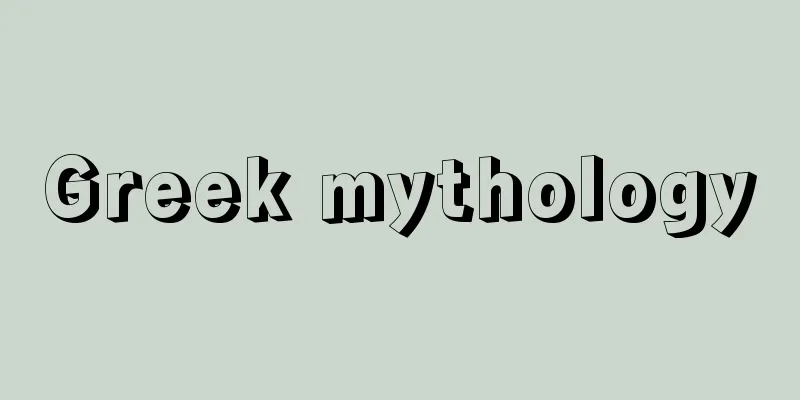Greek mythology

|
Mythology is a mythology told in extant ancient Greek literature and expressed in art, beginning with the two great epic poems "Iliad" and "Odyssey" by Homer, believed to have been written in the 8th century BC, and "Theogony" and "Works and Days" by Hesiod, written around the same time as these. Ancient Roman mythology is also largely an adaptation or restatement of Greek mythology, with the names of gods changed to Latin, such as Zeus becoming Jupiter, Hera becoming Juno, and Athena becoming Minerva. It is usually lumped together as Greek-Roman mythology and treated as part of Greek mythology. Greek mythology is outstanding among the world's mythologies for its richness of content and literary value. It has provided many themes for literature and art, along with the Bible, as a source of inspiration for Westerners in particular, so knowledge of Greek mythology is indispensable for understanding Western culture. [Atsuhiko Yoshida] EstablishedThe origin of Greek mythology dates back much further than the time of Homer and Hesiod. Archaeological excavations beginning with Schliemann have revealed the actual state of the Bronze Age civilization that flourished in the ancient cities of Greece, Crete, and the northwest coast of Asia Minor in the second millennium BC, and Greek mythology clearly reflects aspects of this civilization in many ways. In recent years, the characters used to write Greek in Crete and mainland Greece during the Mycenaean civilization have been deciphered, revealing that many of the most important gods in Greek mythology were already being worshiped at that time. Moreover, the unique language and lyricism used in Homer's poetry have reached a high level of perfection that allows for improvisational recitation and memorization, and it is assumed that behind them were the activities of many generations of epic poets. In other words, it is believed that the existing Greek mythology was not created by Homer or Hesiod, but was probably formed in its original form during the Mycenaean period, written down in literary works, and passed down orally, mainly as epic poems. It is believed that Greek-speaking people first landed on the Greek mainland at the end of the 3rd millennium BC. They migrated with the Greek language, which belongs to the Indo-European language family, and with myths that had already been formed in their native lands. It is believed that the influence of the indigenous myths was greatly incorporated into Greek mythology. Furthermore, the Mycenaean civilization was born under the strong influence of the Minoan civilization of Crete, and was indirectly influenced by the Oriental civilizations that flourished in the eastern Mediterranean region at that time, such as Egypt, Hittite, and Phoenicia, and also by Mesopotamian culture. In fact, the story of a flood that is said to have occurred in the time of Deucalion, the ancestor of mankind, and his wife Pyra, is very similar to the famous story of a great flood in the Mesopotamian "Tales of Gilgamesh," and a story has been found in Hittite mythology that is quite similar to the story of a bloody battle for succession between three generations of heavenly kings, Uranus, Cronus, and Zeus. In other words, the original form of Greek mythology, which is believed to have been established during the Mycenaean period, is thought to have evolved from myths originating from the common culture of the Indo-European peoples whose original homeland was the Eurasian steppes, which were brought over towards the end of the 3rd millennium BC, and which underwent a process of syncretism and change as they adapted to changes in climate and lifestyle. [Atsuhiko Yoshida] FeaturesHowever, despite such mixing and transformation, the structure and elements of the Indo-European mythology have not disappeared, and quite clear traces remain. For example, there are considerable similarities between the hero Hercules and Indra in Hindu mythology and Thor in Germanic mythology, and between Zeus' twin sons Castor and Polydeuces (the Dioscuri) and the brother gods Ashvin in Hindu mythology. In the famous story of the "Judgment of Paris," the Trojan prince Paris was asked by Zeus to choose the most beautiful goddess among Hera, Athena, and Aphrodite. Hera promised him the rule of Asia, Athena the military prowess to win battles, and Aphrodite the most beautiful woman in the world to be his wife. Paris, wanting to marry Helen, the most beautiful woman in the world, decided that Aphrodite was the most beautiful. As a result of this choice, he brought about the Trojan War and the destruction of Troy with his own hands. In other words, although Paris had secured the protection of Aphrodite for himself and Troy, he had angered the two goddesses who were higher in rank than Aphrodite and made them his enemies. As French comparative mythologist G. Dumézil points out, the structure of this story reflects a unique worldview common to the myths of the Indo-European peoples. In other words, according to this worldview of the Indo-European peoples, which Dumézil calls the three-function system, Aphrodite's functions of beauty and lust, along with those related to kingship and religion (Hera) and those of war (Athene), were considered essential functions for maintaining world order, but were considered to be inferior to the other two functions. Similarly, in the Iliad, Aphrodite is sung to be an unusually enthusiastic supporter of the Trojans, while Hera and Athene are the Greeks. Stories with the theme of the rivalry between the two higher functions and the third function as described by Dumézil are common to most of the major Indo-European myths, including those of India, Iran, Germany, Celtic, and ancient Rome, and are thought to have originally constituted one of the important characteristics of the myths of the Indo-European peoples. [Atsuhiko Yoshida] LoreGreek mythology was first sung by Homer and Hesiod, and was later sung in the poems known as the Homeric Hymns, Pindar's victory songs, and other lyric poems. In classical Athens, it provided material for the three great tragic poets Aeschylus, Sophocles, and Euripides, who perfected it into the form we know today. Greek art works such as pottery paintings and temple sculptures also have great value and significance as materials for conveying Greek mythology. During the Hellenistic period, many pedantic mythological poems were created, especially in Alexandria, by Theocritus, Lycophron, and Apollonius of Rhodes, and books such as the Bibliotheke, which is said to be the work of Apollodorus, were also written that provided a standard overview of all Greek mythology. In addition to these works of ancient Greek literature and art, Greek mythology was also treated in detail in Latin literary works such as Virgil and Ovid, and was also featured in the writings of 12th century Byzantine classical scholars such as Eustathius and Tsetses. Westerners' knowledge of Greek mythology has generally been based mainly on Latin literary works such as Ovid. For this reason, most of the gods and heroes from Greek mythology that appear in Western literature and art are named after their Latin names, such as Jupiter or Hercules. [Atsuhiko Yoshida] The Birth of the GodsIn ancient times, the first king of Chaos was the sky god Uranus. He married his mother, the earth Gaia, and first gave birth to 12 gods, six men and six women, called the Titans. He then gave birth to two pairs of monster triplets, but Uranus disliked these deformed children and returned them to Gaia's womb as soon as they were born. Gaia, angry, created a large sickle out of a particularly strong metal called adamas, and had the youngest brother of the Titans, Cronus, cut off Uranus' genitals. Kronos, who took the throne of heaven in place of his castrated father, married his sister Rhea and gave birth to Hestia, the virgin goddess of the hearth. In addition, Demeter, the goddess of fertility and agriculture, Hera, who became the wife of his youngest brother Zeus and became the queen of Olympus, Hades, who became the king of the underworld, and Poseidon, who became the king of the sea, were born one after another. Kronos, who believed in a prophecy that his sons would take the throne from him, swallowed these children one by one. However, Zeus, who was the last born, was raised in secret on the island of Crete on the advice of Gaia, and when he grew up, he gave Kronos a vomiting potion to save his brothers and sisters. Then, together with his brothers, they gathered on Mount Olympus and began fighting against Kronos and the Titans. This battle, called Titanomachy, lasted for 10 years, but eventually Zeus and his men won and imprisoned Kronos and his men in Tartarus, the dark world under the earth. [Atsuhiko Yoshida] Zeus and the Olympian GodsAfter becoming king of heaven, Zeus assigned the status and duties of each god, and first married Metis, the goddess of wisdom. Metis was blessed with a daughter, but Gaia predicted that she would give birth to a boy who would usurp Zeus' throne, so Zeus swallowed the already pregnant Metis into his womb. However, the fetus continued to grow, and eventually Athene, clad in armor and holding a spear and shield, leapt out of the top of Zeus' head, letting out a battle cry. Athene, the goddess of war and all manner of technology, was eternally virginal and was famous as the patron goddess of the city of Athens. Zeus also had many other gods with Themis, the Titan goddess of law, her sister Demeter, and Mnemosyne, the goddess of memory. When Zeus took Leto, the daughter of the Titan Koios, as his lover and impregnated her with twins, a boy and a girl, he was already married to Hera. Hera, jealous of Leto, ordered that the lands of the world not provide Leto with a place to give birth, so Leto was in great difficulty, with her belly in the final month of pregnancy. However, in the end, she was able to give birth to Artemis and Apollo on the island of Delos, which was not subject to Hera's ban at the time because it was still a floating rock mass on the surface of the sea and did not count as land, and so she was able to give birth to Artemis and Apollo. As a result, Delos, which became the sacred place where Apollo was born, was fixed in the center of the Cyclades Islands in the Aegean Sea, which is the center of the Greek world. Apollo was also the god of music and the father of the god of medicine Asclepius. He was a god of medicine who saved humans and cities from all kinds of illnesses, but he was also the god of bows and arrows, and it was believed that when his arrows were shot at humans, they would become arrows of plague that would bring death. The virgin goddess Artemis, who was fastidious about cleanliness, led her virgin nymphs on hunting expeditions in the mountains and fields, but she was also the patron deity of wild animals and was believed to protect the birth and growth of human children. Later, Apollo came to be regarded as the sun god and Artemis as the moon goddess, but in the original Greek mythology, the sun god was Helios and the moon goddess was Selene, and they were considered to be the children of the Titan Hyperion along with the dawn goddess Eos. Zeus had children with Hera: Hebe, the goddess of youth; Eileitheia, the goddess of childbirth; and Ares, the cruel god of war who loved slaughter and bloodshed. Zeus also had many children with human women, but the two who became important gods were Dionysus and Hercules. Like the other sons born to human women, Hercules was born to his mother Alcmene as a mortal human hero. However, despite the indescribable suffering caused by Hera's relentless persecution, he endured the hardships and achieved countless superhuman feats, including the 12 labors, proving that he was worthy of being an immortal god. In the end, infected with a deadly poison, he had a pile of firewood built on the top of Mount Oita and was burned to death on it, despite the agony. However, the divinity he received from Zeus at that time was released from his burning body and he ascended to heaven, where he was reconciled with Hera through Zeus' intercession, married Hebe, and was added to the ranks of the chief gods of Olympus. Aphrodite, the goddess of beauty and love, counted among the twelve Olympians along with Zeus, Hera, Poseidon, Hestia, Demeter, Athena, Apollo, Artemis, Ares, Hephaestus, and Hermes, is said to be the daughter of Zeus, born from the goddess Dione. However, there are also stories that she was the daughter of Uranus, born in the foam that rose from the penis of Uranus, which was thrown into the sea, and landed on the island of Cyprus, went to Olympus, and joined the company of the gods. According to one myth, she was forced to marry Hephaestus, but hating her ugly husband, she had an affair with the muscular Ares. In later myths, Eros, the god of love, came to be considered the son of Aphrodite, born from this adultery. In the old myths, Eros was one of the oldest deities that arose after Chaos in the primordial era, but when Aphrodite was born, he willingly became her servant. [Atsuhiko Yoshida] The emergence of humanityThe earliest humans were the Golden Race, who arose when Cronus was still king in heaven. They knew neither hardship nor misfortune, and lived immortal lives, indulging only in the pleasures of feasting. When they died peacefully, as if in sleep, the arrogant and ungodly Silver and Bronze Races appeared. The Bronze Race, who were obsessed with fighting and had no other interests, were destroyed by the great flood caused by Zeus, and a race of semi-divine heroes whose exploits are told in mythology was born. After this race died out, the present Iron Race, humans, arose. Humans today suffer from all kinds of disasters and must live a fleeting life. This originates from Zeus' anger at Prometheus, the son of the Titan Iapetus, for deceiving Zeus and stealing fire from the heavens and giving it to humans. Zeus ordered the gods to create the first human woman, Pandora, and marry her to Prometheus' foolish brother, Epimetheus. Furthermore, Hermes created a race of women descended from Pandora, who were endowed with shameless hearts and the nature of thieves, and it was decided that the fate of human men would be to marry them and live a life plagued by lies and greed. Furthermore, Pandora removed the lid of a jar she found in her husband's house, causing all the disasters that had been sealed inside to escape. As a result, mankind has had to live ever since, constantly threatened from without by various disasters, yet inspired by hope from within, and at the same time deceived. The heroic race of mankind emerged on earth after the great flood, already bearing the fate determined by Zeus. Therefore, the stories of their exploits, in which they endured the harshness of this fate and achieved many glorious feats, were of great significance to the ancient Greeks, as they provided a guide for how to live. [Atsuhiko Yoshida] "Dictionary of Greek and Roman Mythology" by Takatsu Harushige (1960, Iwanami Shoten) " ▽ "Greek and Roman Mythology" by Yoshida Atsuhiko (1982, Chikuma Shobo)" ▽ "The Essence of Greek Mythology" by G.S. Kirk, translated by Tsujimura Seizo et al. (1980, Hosei University Press)" ▽ "Illustrated Dictionary of Greek and Roman Mythology and Culture" edited by Rene Martin, translated by Matsumura Kazuo (1997, Hara Shobo)" ▽ "Greek and Roman Mythology" by M. McCrone, translated by Kai Akiko and Otsu Tetsuko (2000, Sogensha)" ▽ "Greek Mythology, Volumes 1 and 2 by Go Shigekazu (Shincho Bunko)" ▽ "Greek and Roman Mythology" by T. Bulfinch, translated by Nogami Yaeko (Iwanami Bunko)" ▽ "Greek Mythology and Heroic Legends, Volumes 1 and 2, by T. Bulfinch, translated by Shigenobu Sadotani (Kodansha Academic Library)" [References] | | | | | | | | | | | | | | |Virgil| | | | | | | | | | | | | | | | | | | | | | | |Dioskroi| | | | | | | | | | | | | | | | | | | | | | | | | | | | | |©Shogakukan "> Greek Mythology/Genealogy Source: Shogakukan Encyclopedia Nipponica About Encyclopedia Nipponica Information | Legend |
|
紀元前8世紀の作品とされるホメロスの二大叙事詩『イリアス』と『オデュッセイア』、およびこれらとほぼ同時代のヘシオドスの『神統記』『仕事と日々』を嚆矢(こうし)とする、現存の古代ギリシア文学に物語られ、美術に表されて伝えられた神話。古代ローマの神話も、ゼウスをユピテル、ヘラをユノ、アテネをミネルバというように、神名をラテン語にかえた程度にすぎず、大部分はギリシア神話の翻案か、再説されたものである。通常はギリシア・ローマ神話として一括され、ギリシア神話の一部として取り扱われている。ギリシア神話は、世界の神話のなかでも内容の豊富さにおいて際だっており、文学的価値においても傑出している。とくに欧米人の発想の源泉として、聖書とともに文学、芸術などに多くの主題を提供してきたため、欧米文化を理解するためには、ギリシア神話の知識を欠くことができない。 [吉田敦彦] 成立ギリシア神話の起源は、ホメロスやヘシオドスの時代よりもずっと古くにさかのぼる。シュリーマンに始まる考古学的発掘により、紀元前二千年紀にギリシアとクレタ島、および小アジア北西海岸の古代都市で栄えていた青銅器文明の実態が明らかにされたが、ギリシア神話のなかには、この文明の様相がいろいろな点で如実に反映されている。また近年、ミケーネ文明の時代にクレタ島とギリシア本土でギリシア語を記すのに用いられていた文字が解読され、ギリシア神話のなかのもっともおもだった神々の多くが、当時すでに祭祀(さいし)を受けていたという事実も判明した。しかも、ホメロスの詩に用いられている独特の言語と作詩法は、即興的に吟唱、暗唱するのにきわめて高い完成度に達しており、その背後には多くの世代にわたる叙事詩人たちの活動があったと推定される。つまり、現存するギリシア神話は、ホメロスやヘシオドスらによってつくりだされたものではなく、すでにミケーネ時代に原形が形成され、文学作品に書き留められて、おもに叙事詩として口承されたことが確実と思われる。 ギリシア語を話す民族が初めてギリシア本土に上陸したのは、さらに古く前三千年紀末葉のことであったと考えられ、彼らはインド・ヨーロッパ語族に属するギリシア語とともに、すでに原住地で形成されていた神話をもって移住してきたと考えられる。ギリシア神話には、その先住民の神話の影響が大幅に取り入れられたと思われる。そのうえ、ミケーネ文明はクレタ島のミノア文明の強い影響を受けて生まれており、エジプトやヒッタイト、フェニキアなど、当時東地中海域に栄えていたオリエント諸文明を介して、さらにメソポタミアの文化からも間接的影響を受けていたと考えられる。事実、人類の始祖デウカリオンとその妻ピラの時代におこったとされている洪水の話は、メソポタミアの『ギルガメシュ物語』の有名な大洪水の話に酷似しており、ヒッタイト神話のなかには、ウラノス、クロノス、ゼウスの3代にわたる血なまぐさい天上の王の交代争闘の話とかなりよく似た物語が発見されている。つまり、ミケーネ時代に成立したと目されるギリシア神話の原形は、前三千年紀末葉に持ち込まれた、ユーラシアのステップ地帯を原郷とするインド・ヨーロッパ諸族の共通文化に由来する神話が、風土と生活の変化に適応しながら混淆(こんこう)と変化を遂げたものと考えられる。 [吉田敦彦] 特徴しかし、そのような混淆と変化によっても、インド・ヨーロッパ諸族神話の構造と要素は消滅しておらず、かなり明瞭(めいりょう)な痕跡(こんせき)をとどめている。たとえば英雄ヘラクレスとインド神話のインドラやゲルマン神話のトールとの間、またゼウスの双子の息子のカストルとポリデウケス(ディオスクロイ)とインド神話の兄弟神アシュビンとの間には、かなりの類似がみられる。また有名な「パリスの審判」の話では、ヘラとアテネとアフロディテのうちでもっとも美しい女神を選ぶことをゼウスから求められたトロヤの王子パリスは、ヘラからアジアの支配を、アテネから戦闘に勝つことができる武勇を、アフロディテから世界一の美女を妻に与えることを贈り物として約束された。そこでパリスは、世界一の美女ヘレネと結婚したいがため、アフロディテをもっとも美しいと判定する。この選択の結果、彼はトロヤ戦争とトロヤの破滅を自らの手で招くことになった。つまりパリスは、自分とトロヤのためにアフロディテの庇護(ひご)を確保したものの、アフロディテより上位の2女神を怒らせ敵にしてしまったわけである。 この話の構成には、フランスの比較神話学者G・デュメジルが指摘しているように、インド・ヨーロッパ諸族神話に共通してみられる独特の世界観が反映されている。つまり、デュメジルによって三機能体系とよばれているこのインド・ヨーロッパ諸族の世界観によれば、アフロディテのつかさどる美や愛欲の機能は、王権と宗教に関係する機能(=ヘラ)、および戦闘の機能(=アテネ)とともに、世界の秩序維持のために肝要な機能とされたが、他の2機能より下位のものとみなされた。同様に『イリアス』のなかでも、アフロディテがトロヤ側に、ヘラとアテネがギリシア側に異常なほど熱心に味方して抗争するようすが歌われている。このように上位2機能と、デュメジルのいう第三機能との間の角逐を主題とする話は、インド、イラン、ゲルマン、ケルト、古代ローマなど、おもなインド・ヨーロッパ諸族神話のほとんどに共通してみいだされるもので、もともとインド・ヨーロッパ諸族神話の重要な特徴の一つを構成していたと思われる。 [吉田敦彦] 伝承ギリシア神話は、ホメロスやヘシオドスに歌われたのち、『ホメロス賛歌』として伝えられている詩や、ピンダロスの競技勝利歌、その他の叙情詩に歌われ、古典期のアテネではアイスキロス、ソフォクレス、エウリピデスの三大悲劇詩人に題材を提供し、彼らによってわれわれの知るものに近い形に完成された。陶器絵や神殿の彫刻などのギリシア美術の作品も、ギリシア神話を伝える資料として重要な価値と意味をもっている。ヘレニズム時代には、とくにアレクサンドリアで、テオクリトスやリコプロン、ロドスのアポロニオスらによって衒学(げんがく)的な神話詩が数多くつくられ、アポロドロス作として伝わる『ビブリオテケ』のような、ギリシア神話の全体を標準的に概説したような書物も著された。これら古代ギリシアの文学と美術のほかに、ギリシア神話はウェルギリウスやオウィディウスらのラテン文学の作品でも詳しく取り扱われ、さらに12世紀のビザンティンの古典学者エウスタティオスやツェツェスらの著作のなかでも取り上げられている。欧米人のギリシア神話に関する知識は、一般にはオウィディウスに代表されるラテン文学の作品をおもな典拠としてきた。そのため、欧米の文学や美術に出てくるギリシア神話の神々や英雄たちは、ほとんどユピテルとかヘルクレスなど、ラテン語名に基づいた名でよばれている。 [吉田敦彦] 神々の誕生原古、混沌(こんとん)の深淵(しんえん)カオスに王として最初に君臨したのは、天空ウラノスである。彼は母である大地ガイアと結婚し、まずティタンという男女6柱ずつあわせて12柱の神々をもうけた。さらに2組の三つ子の怪物たちを生むが、ウラノスはこれら異形の子供たちを嫌って、生まれるとすぐにガイアの胎内に戻してしまった。怒ったガイアは、アダマスという特別頑丈な金属を発生させて大きな鎌(かま)をつくり、ティタンたちの末弟クロノスにウラノスの性器を切り取らせた。 去勢された父にかわって天上の王位についたクロノスは、姉のレアと結婚し、炉の女神で処女神のヘスティアを生む。さらに、豊穣(ほうじょう)と農業の女神デメテル、末弟ゼウスの正妻となりオリンポスの女王の位につくヘラ、冥府(めいふ)の王となるハデス、海の王となるポセイドンが次々に誕生した。息子たちに王位を奪われるという預言を信じたクロノスは、これらの子供たちを次々に飲み込んでしまう。だが最後に生まれたゼウスだけは、ガイアの助言によりクレタ島に隠されて育てられ、成長するとクロノスに吐き薬を飲ませて兄と姉たちを助けた。そして、兄たちと協力してオリンポス山上に集結し、クロノスとティタンたちに対し戦いを開始した。ティタノマキアとよばれるこの戦闘は10年間続いたが、やがてゼウスたちの勝利に終わり、クロノスらを地底の暗黒界タルタロスに幽閉してしまった。 [吉田敦彦] ゼウスとオリンポスの神々天上の王となったゼウスは、神々にそれぞれの地位と職分を定め、自らはまず知恵の女神メティスと結婚した。メティスは女児に恵まれるが、次に男児が生まれ、その子はゼウスの王位を奪うことになるとのガイアの預言から、ゼウスはすでに妊娠していたメティスを腹の中に飲み込んでしまう。ところが胎児はそのまま成育し、やがて甲冑(かっちゅう)を着けて槍(やり)と楯(たて)を持ったアテネが、雄たけびをあげながらゼウスの頭のてっぺんから飛び出した。戦いの女神であり、技術万般の神でもあるアテネは永遠に処女で、アテネ市の守護女神として名高い。 ゼウスはこのほかに、ティタンの一人で掟(おきて)の女神テミス、姉のデメテル、さらに記憶の女神ムネモシネなどとの間にも多くの神々をもうけた。ゼウスがティタンのコイオスの娘レト女神を愛人にして、彼女に男女の双子を懐妊させたとき、彼はすでにヘラと結婚していた。レトに嫉妬(しっと)したヘラは、世界中の土地に対し、レトに分娩(ぶんべん)の場所を提供してはならないと命令したため、レトは臨月の腹を抱えて難渋した。しかし最後に、当時はまだ海面に漂う岩塊で、土地の数に入らなかったために、ヘラの禁令を受けていなかったデロス島に頼み込み、アルテミスとアポロンを出産することができた。その結果、アポロン誕生の聖地となったデロス島は、ギリシア世界の中心にあたるエーゲ海上のキクラデス諸島の真ん中に固定された。アポロンは音楽の神でもあり、医神アスクレピオスの父である。彼は、人間と都市のあらゆる病に治癒をもたらす救い主的医神でもあった反面、弓矢の神であり、彼の矢が人間に向かって放たれると、死を招く疫病の矢になると信じられた。潔癖な処女神アルテミスは、処女のニンフたちを率いて山野で狩りにふけるが、同時に野獣の守護神でもあり、人間の子供の誕生と成長にも加護を垂れると信じられた。のちにアポロンは太陽神、アルテミスは月の女神とみなされるようになるが、もともとのギリシア神話の太陽神はヘリオス、月の女神はセレネで、曙(あけぼの)の女神エオスとともにティタンのヒペリオンの子とされていた。 ゼウスはヘラとの間に青春の女神ヘベと、お産の女神エイレイテイア、それに殺戮(さつりく)と流血を好む残忍な戦神アレスをもうけた。ゼウスは人間の女にも多くの子を生ませるが、そのなかで例外的に有力神の地位を得たのが、ディオニソスとヘラクレスである。ヘラクレスは、人間の女から生まれた他の息子たちと同様、可死の人間の英雄として母のアルクメネから生まれた。しかし、ヘラの執拗(しつよう)な迫害によって筆舌に尽くせぬ苦しみをなめさせられながらも、その艱難(かんなん)に耐え、12の功業をはじめとする無数の超人的偉業を達成して、不死の神にふさわしい器量の持ち主であることを証明した。彼は最後には、からだ中を猛毒に冒され、苦悶(くもん)しながらもオイタ山の頂上に薪(たきぎ)の山を築かせてその上で焼け死ぬ。だが、そのときゼウスから受けた彼の神性は、燃えた肉体から解放されて天に昇り、ゼウスのとりなしによってヘラとも和解し、ヘベと結婚してオリンポスの主神たちの列に加えられた。 ゼウス、ヘラ、ポセイドン、ヘスティア、デメテル、アテネ、アポロン、アルテミス、アレス、ヘファイストス、ヘルメスとともに、オリンポス十二神の一つに数えられる美と愛の女神アフロディテは、一伝によれば、ディオネ女神から生まれたゼウスの娘である。しかし、彼女はウラノスの娘で、海に投げ捨てられたウラノスの男根からわいて出た泡の中で生まれ、キプロス島に上陸してオリンポスに行き、神々の仲間に加わったとする伝えもある。ある神話によれば、彼女はヘファイストスと結婚させられたが、醜男(ぶおとこ)の夫を嫌って、たくましいアレスと密通を重ねた。後の神話では、愛神エロスはこの不義によって生まれたアフロディテの息子とみなされるようになった。古い神話でのエロスは、原初にカオスに続いて発生した最古の神格の一つであったが、アフロディテが誕生すると、自ら進んで彼女に随従するようになったとされている。 [吉田敦彦] 人類の発生最古の人類は、クロノスがまだ天上の王であった時代に発生した黄金の種族で、労苦も災いも知らず、不老のまま宴会の悦楽のみにふけって暮らすことができた。彼らがまるで眠るように安らかに死に絶えると、こんどは傲慢(ごうまん)で不敬虔(けいけん)な銀と青銅の種族が出現した。戦闘ばかりに熱中し、ほかになんの関心ももたなかった青銅の種族が、ゼウスのおこした大洪水によって滅ぼされたあとに生じたのが、神話に活躍を物語られている半神的英雄たちの種族である。そしてこの種族が死に絶えたのちに、現在の鉄の種族である人類が発生した。 いまの人類は、あらゆる種類の災いに苦しめられ、つかのまの生を生きなければならない。それは、ティタンのイアペトスの息子プロメテウスが、ゼウスを欺いて天から火を盗み、人間に与えてしまったことへの怒りに原点がある。ゼウスは神々に命じて、最初の人間の女パンドラをつくらせ、プロメテウスの弟で愚か者のエピメテウスに嫁がせた。さらにヘルメスにより、破廉恥(はれんち)な心と盗人の性質を入れられたパンドラの後裔(こうえい)の女たちの種族が発生し、これと結婚して、嘘(うそ)と貪欲(どんよく)に悩まされながら暮らすことが、人間の男の運命と決められた。そのうえパンドラは、夫の家でみつけた甕(かめ)の蓋(ふた)をとり、それまで中に封じ込められていたあらゆる災いを外に飛び出させてしまった。その結果、人間は以後もろもろの災いに絶えず外側から脅かされながら、内部からは希望によって鼓舞されると同時に、欺かれて生きていかなければならなくなった。 英雄の種族の人類は、ゼウスによって定められた運命をすでに負わされて大洪水のあと地上に発生した。それゆえ、この運命の過酷さに耐え、多くの輝かしい偉業を成し遂げた彼らの活躍の物語は、古代ギリシア人にとって生き方の指針を示す、大きな意味をもったのである。 [吉田敦彦] 『高津春繁著『ギリシア・ローマ神話辞典』(1960・岩波書店)』▽『吉田敦彦著『ギリシア・ローマの神話』(1982・筑摩書房)』▽『G・S・カーク著、辻村誠三他訳『ギリシア神話の本質』(1980・法政大学出版局)』▽『ルネ・マルタン監修、松村一男訳『図説 ギリシア・ローマ神話文化事典』(1997・原書房)』▽『M・マクローン著、甲斐明子、大津哲子訳『ギリシア・ローマ神話』(2000・創元社)』▽『呉茂一著『ギリシア神話』上下(新潮文庫)』▽『T・ブルフィンチ著、野上弥生子訳『ギリシア・ローマ神話』(岩波文庫)』▽『T・ブルフィンチ著、佐渡谷重信訳『ギリシア神話と英雄伝説』上下(講談社学術文庫)』 [参照項目] | | | | | | | | | | | | | | | | | | | | | | | | | | | | | | | | | | | | | | | | | | | | | | | | | | | | | | | | | | | | | | | | | | | | |©Shogakukan"> ギリシア神話/系図 出典 小学館 日本大百科全書(ニッポニカ)日本大百科全書(ニッポニカ)について 情報 | 凡例 |
>>: Greek Anthology - Greek Anthology (English)
Recommend
Akizaki rapeseed - Akizaki rapeseed
…Pickled vegetables are one or two year old culti...
Twelve Seats Kagura - Jyuunizakagura
In Kagura music, one piece is counted as one perfo...
Commutative group - Kakangun (English spelling) commutative group
In a group, when its operations are commutative (f...
Firozabad (English spelling)
…He built irrigation systems in northern India, c...
"Uwanari Nue Yorimasa"
...A style of Kabuki and Ningyo-Joruri. Uwanari m...
Opus Mayus - Opus Mayus
…Technically, the Middle Ages knew about perspect...
Onibishi (plant) - Onibishi
...In China, the fruit is used to cool down. In t...
Bibenzyl
An aromatic hydrocarbon. Also called dibenzyl or 1...
Guchu Shukyu - Guchu Shukyu
Year of death: August 25, 16th year of the Oei per...
Giteki - Giteki
A legendary Chinese figure. It is said that he was...
Erethizontidae
…Their life span in the wild is thought to be 12 ...
Wirye Fortress - Wirye Fortress (English spelling)
The first capital of Baekje, one of the three anci...
Amago - Amago
A fish belonging to the bony fish family Salmonid...
Intestinal metaplasia
…When gastric mucosa atrophy progresses, the muco...
Medium-sized
Nakagata originally meant a medium-sized pattern,...

![Warm water [hot spring] - Nuruyu](/upload/images/67cc750a113fb.webp)







